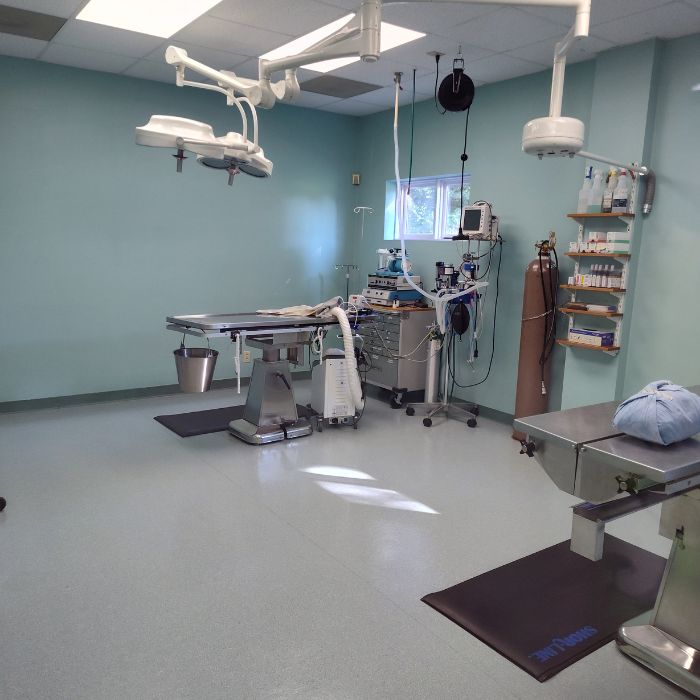Surgeries
We are pleased to offer a surgical facility that enables us to provide the best care possible for all of our patients. Our facility allows us to perform a wide variety of advanced surgical procedures. These procedures range from the head to the tail.
All of our veterinarians feel that spaying and neutering your pet is an essential part of protecting your animal’s health in the future. Research has shown that spaying or neutering your pets can be very beneficial to your pet’s short-term and long-term health.
Please click on the links below to see some frequently asked questions regarding spaying and neutering procedures:
Canine Spay and Neuter – Frequently Asked Questions
Feline Spay and Neuter – Frequently Asked Questions
Why Is My Dog Crying After Surgery – Frequently Asked Questions
Canine Spay and Neuter – Frequently Asked Questions
Why is it important to have my dog spayed or neutered?
Males
- Pregnancy prevention
- Decreases likelihood of prostate infections and prostate cancer
- Eliminates testicular cancer
- Longer life span due to decreased roaming, fights, hit by car rates in neutered dogs
Females
- Pregnancy prevention
- Prevents possibility of life threatening uterine infection
- If done at < 18 mo. of age, decreases chance of mammary cancer by 85%
Why is bloodwork recommended before my dog has surgery?
While we always do a thorough pre-surgical exam some abnormalities may not be detected with just an exam. Bloodwork more closely evaluates liver and kidney parameters, electrolytes, red blood cells, and platelets. For example, if an animal has low platelets that could interfere with blood clotting, which is essential for a successful surgery.
What is the purpose for having my dog on fluids during surgery and afterwards in recovery?
- Maintains hydration; animal must be fasted from food and water prior to surgery
- Helps maintain blood pressure
- In event of adverse anesthetic reaction, we have instant access to bloodstream with possibly life saving medications
- In rare event of hemorrhage giving fluids is initial treatment
Does Southeast Community Animal Hospital always use pain injections either before or after surgery?
Yes, once the animal is off gas anesthesia there is NO lasting pain control unless we supplement it with pain medications. The more painful the procedure, the more pain medications are required.
How do I know if my dog needs to have pain medication after surgery?
What should I look for in my dog after surgery to make sure they're recovering well?
Males
- There are no sutures. The incision should stay closed. Mild redness and finger-width swelling are normal for the first few days.
- The incision site should never have discharge.
- In adults, scrotal swelling is common and will resolve within about 2 weeks.
Females
- Sutures typically placed.
- Mild redness and finger-width swelling may appear in the first couple of days.
- No cream-colored discharge should be seen at the incision site.
Feline Spay and Neuter – Frequently Asked Questions
Why is it important to have my cat spayed or neutered?
Males
- Pregnancy prevention
- Longer life span due to decreased roaming, fighting, and chances of being hit by a car
- Eliminates testicular cancer
- Decreased urine spraying
Females
- Pregnancy prevention
- Prevents possibility of life threatening uterine infection
- Heat Cycles which can be very annoying behavior
Why is bloodwork recommended before my cat has surgery?
While we always do a thorough pre-surgical exam, some abnormalities may not be detected with just an exam. Bloodwork more closely evaluates liver and kidney parameters, electrolytes, red blood cells and platelets. For example, if an animal has low platelets that could interfere with blood clotting, which is essential for a successful surgery.
What is the purpose for having my cat on fluids during surgery and afterwards in recovery?
- Maintains hydration; animal must be fasted from food and water prior to surgery
- Helps maintain blood pressure
- In event of adverse anesthetic reaction, we have instant access to bloodstream with possibly life saving medications
- In rare event of hemorrhage giving fluids is initial treatment
How do I know if my cat needs to have pain medication after surgery?
Possible signs of pain may include the following: not eating well, limping, is painful when you touch the surgery site. Each animal will respond differently. It is best and most effective to treat the pain before it starts than to treat when already painful.
What should I look for in my cat after surgery to make sure they're recovering well?
Males
- There are no sutures. The incision should stay closed. Mild redness and finger-width swelling are normal for the first few days.
- The incision site should never have discharge.
- In adults, scrotal swelling is common and will resolve within about 2 weeks.
Females
- Sutures typically placed.
- Mild redness and finger-width swelling may appear in the first couple of days.
- No cream-colored discharge should be seen at the incision site.
The information provided in this website is for educational or general informational purposes only. It is not intended to treat, apply to or diagnose any specific animal or condition. To provide the best possible care for your pet, contact your veterinarian for specific instructions and recommendations.

